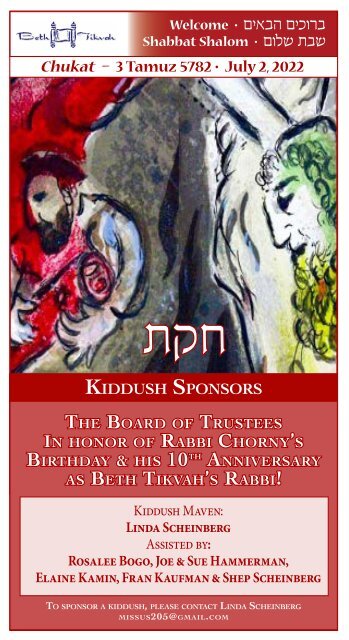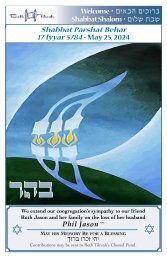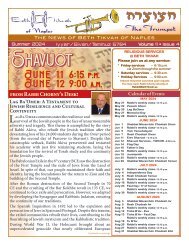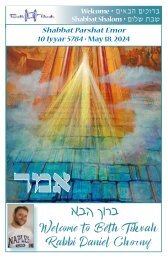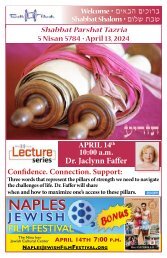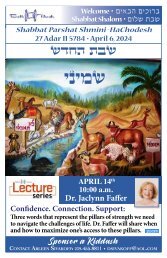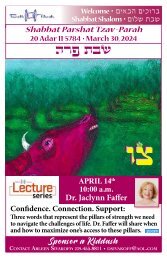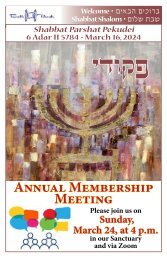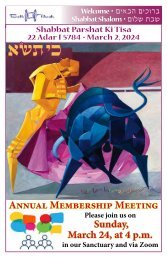You also want an ePaper? Increase the reach of your titles
YUMPU automatically turns print PDFs into web optimized ePapers that Google loves.
Welcome • ohtcv ohfurc<br />
Shabbat Shalom • ouka ,ca<br />
<strong>Chukat</strong> – 3 Tamuz 5782 • July 2, 2022<br />
,ej<br />
Kiddush Sponsors<br />
The Board of Trustees<br />
In honor of Rabbi Chorny’s<br />
Birthday & his 10 th Anniversary<br />
as Beth Tikvah’s Rabbi!<br />
Kiddush Maven:<br />
Linda Scheinberg<br />
Assisted by:<br />
Rosalee Bogo, Joe & Sue Hammerman,<br />
Elaine Kamin, Fran Kaufman & Shep Scheinberg<br />
To sponsor a kiddush, please contact Linda Scheinberg<br />
missus205@gmail.com
Yahrtzeiten<br />
July 2 • Tammuz 3 Max Stein – Father of Ralph Stein<br />
Alfred Walpert – Husband of Ferne Walpert<br />
July 3 • Tammuz 4 Peter Portnoy – Father of Bernard Portnoy<br />
July 4 • Tammuz 5 Thelma Erenstoft – Mother of Edward Margulies<br />
July 7 • Tammuz 8 Fred M. Samotin – Father of Myles Samotin<br />
July 8 • Tammuz 9 Bertha Weiss – Grandmother of Mark Wasserman<br />
Birthdays<br />
July 2 Rabbi Ammos Chorny, Jay Kaye, Lawrence Macks<br />
July 3 Michael Sobol,<br />
July 5 Ilya Prizel,<br />
July 6 Kathy Greenberg, Debra Antzis, David Sivakoff<br />
Torah & Haftarah Readings:<br />
Shabbat <strong>Chukat</strong>: Numbers 20:22-22:1 (Etz Hayim p. 887)<br />
1. 20:22-21:3 2. 21:4-10 3. 21:11-16 4. 21:17-20<br />
5. 21:21-25 6. 21:26-33 7. 21:34-22:1 M. 21:34-22:1 (p. 892)<br />
Haftarah: Judges 11:1-33 (Etz Hayim p. 910)<br />
Torah / Haftarah Summary<br />
D'var Torah:<br />
The Destructiveness of Anger – Rabbi Mordechai Silverstein<br />
The tragic incident at Mei Merivah, which occurred towards the end of<br />
the desert trek, marked the low point in Moshe’s career as the prophet<br />
and leader of the people. Once again, the people demanded from him<br />
water and once again, they taunted him with outcries that he had brought<br />
them out of Egypt to die in the desert. As before, Moshe and Aharon<br />
pleaded with God to intercede and help them meet the people’s demands<br />
and God answered their request: “You and your brother Aharon take the<br />
staff and assemble the community, and before their very eyes order the<br />
rock to yield its water…” (Num. 20:8) Moshe took his staff, assembled the<br />
people and addressed them sternly: “Listen you rebels, shall we get water<br />
for you out of this rock?” (20:10) Moshe struck the rock twice and out<br />
flowed water. For some unrevealed reason this episode ended tragically,<br />
for God punished Moshe and Aharon, by denying them permission to<br />
enter the land.<br />
The Torah never makes it clear what Moshe and Aharon did to prompt<br />
God’s ire, fostering a plethora of different interpretive possibilities. (Far<br />
too many to recount all of them!) Situations like this, it is worth noting,<br />
provide great midrashic and homiletic opportunities affording us with<br />
windows into the thinking of the interpreters.<br />
Rashi resolves this question technically through a careful reading of the<br />
plot. God said to talk to the rock, so that is what Moshe should have done;<br />
instead, he struck the rock. According to Rashi, this was a clear case of<br />
disobedience before God and a show of breach of faith before the people.<br />
Rabbeinu Hananel (11 th century Kairouan – Tunisia), on the other hand,
asserts the Moshe’s sin was that he seemingly took credit for himself<br />
in performing the miracle instead of attributing it to God. (See Ramban’s<br />
survey of the various interpreters)<br />
For Rambam (Maimonides), Moshe’s sin was in exhibiting inappropriate<br />
behavior as a leader:<br />
You know that He (God), may He be esteemed, said to the master of both<br />
earlier generations and later generations, Moshe Rabeinu (our teacher):<br />
‘Because you did not trust Me enough to affirm My sanctity in the sight<br />
of the Israelite people’ (Num. 20:12), on that you disregarded My command<br />
(20:24), for you broke faith with Me among the children of Israel (Deut.<br />
32:51).” All this on account of his sin, peace be with him, for veering to<br />
an extreme from the quality of moderation, by showing anger by saying:<br />
“Listen, you rebels” (Num. 20:10) God criticized him since for a man like<br />
him it is inappropriate to become angry before the children of Israel…<br />
(adapted from Shmonah Perakim ch. 4, M. Schwartz ed. p. 25 Heb.)<br />
Since proper behavior, according to Rambam, requires a person to<br />
act with moderation, a show of anger, particularly for a leader who<br />
represented God, was inappropriate. Rambam was not the first to assert<br />
that it was Moshe’s anger that “did him in”. (I would also not be surprised<br />
if the following midrash was the inspiration for his interpretation.) What<br />
this midrash adds, though, is a storyline for what prompted Moshe’s<br />
angry outburst:<br />
And all Israel stood and saw the miracles of the rock. They began to say<br />
[to themselves]: ‘Moshe knows the ways of that [particular] rock. If he<br />
wants, he knows how to draw water for us from it (and therefore, there<br />
is no miracle in that!). So, they said to him: ‘Here is the rock. Just as you<br />
wanted to bring forth water from that rock, bring it forth from this rock.’<br />
This put Moshe in a quandary over what to do. If he listened to the people,<br />
then it would be necessary to ignore the words of God. [In exasperation,]<br />
he yelled back at them: ‘Listen, you rebels, shall we get water out of this<br />
rock?’ (Num. 20:10) (Adapted from Tanhuma Hukat 9)<br />
Moshe, like most leaders, was constantly tested by his people. Should he<br />
abide by principle and follow God’s words or should he give in to popular<br />
demands. All this at the very end of his successful forty-year mission to<br />
transport his people to its homeland. Imagine the tremendous stress and<br />
anxiety thrust upon him. In the end, according to this midrash, he burst<br />
forth and blurted out an inappropriate response to the people, something<br />
a leader must never do, rendering himself no longer capable of leading<br />
the people.<br />
What a tragedy! What a lesson for all of us in dealing with others<br />
D’var Haftarah:<br />
Life's Tightrope – Rabbi Mordechai Silverstein<br />
There are lots of difficult biblical stories; some which transmit societal<br />
rules and then go about breaking them as part of the storyline. We
are familiar with this phenomenon already from the earliest stories<br />
in the Torah. Early biblical society practiced a principle known as<br />
primogeniture, namely, the firstborn son was intended to carry on<br />
the familial legacy. Yet, time after time, in the patriarchal stories, it was<br />
not the firstborn who heads up the next generation but the younger son.<br />
In our haftarah, Yiftah is a character, who for all intents and purposes,<br />
was meant to be a societal outcast. He was born of an illicit relationship:<br />
“And Yiftah the Gileadite was a valiant warrior, and he was the son of<br />
a whore-woman, and Gilad had begotten Yiftah.” (11:1) This did sit well<br />
with his step brothers, sired by his father once he married: “And Gilad’s<br />
wife bore him son, and the wife’s sons grew up and they drove Yiftah out<br />
and said to him: ‘You shall not inherit your father’s house, for you are<br />
the son of another woman.’” (11:2) Yiftah was forced to flee and to live<br />
on the fringe of society. The story obviously does not end here for Yiftah<br />
becomes a “strongman” who is called upon to save the nation from its<br />
enemies and to serve both as its leader and savior.<br />
The medieval commentators make an effort to try to temper Yiftah’s<br />
strangeness by somehow elevating his social status. Targum Yonatan,<br />
the Jewish Aramaic translation of the Prophets, turns “zonah – harlot”<br />
into “pundekita -innkeeper”. Rabbi David Kimche (12 th century Provence)<br />
asserts that Yiftah’s mother was a “pilegesh” (concubine), a relational<br />
status established in rabbinic law. He further states that the reason she<br />
had this status was because it was thought improper to marry someone<br />
outside of your own tribe so that the tribe’s property would remain in<br />
house. The common thread in these comments is the search to give<br />
Yiftah a sense of legitimacy.<br />
Still, it seems that the story is intent in capitalizing on Yiftah’s status as<br />
an outsider, a common theme among the heroes of the book of Judges.<br />
Perhaps there is a lesson to be had here in both the biblical story and the<br />
attempt of the commentators to legitimize Yiftah’s status. The storyline<br />
seemingly chastises the community for making Yiftah an outcast. It<br />
makes its leaders “eat their words”. On the other hand, the commentators<br />
teach us how important it is for a society to have rules which govern<br />
conduct in order to establish legitimacy. The wisdom is in knowing how<br />
to balance between these two disparate values.<br />
“...rautn vhfnu`u vc ohehzjnk thv ohhj Jg”<br />
“She is a tree of life to those who embrace her;<br />
Remember<br />
those who<br />
Lunch-N-Learn<br />
hold her tight are happy…”<br />
with<br />
Rabbi Chorny Tuesdays at 12:15 P.M.<br />
Dedicate new leaves in commemoration of<br />
life’s joys & celebrations<br />
Please contact Linda Scheinberg: MISSUS205@GMAIL.COM or<br />
Harvey Rosenthal: HAROSENTHAL80@GMAIL.COM<br />
Beth Tikvah of Naples<br />
1459 Pine Ridge Road<br />
Naples, FL 34109<br />
(239) 434-1818<br />
Visit us online at<br />
bethtikvahnaples.org<br />
or scan the QR code<br />
to go there directly


